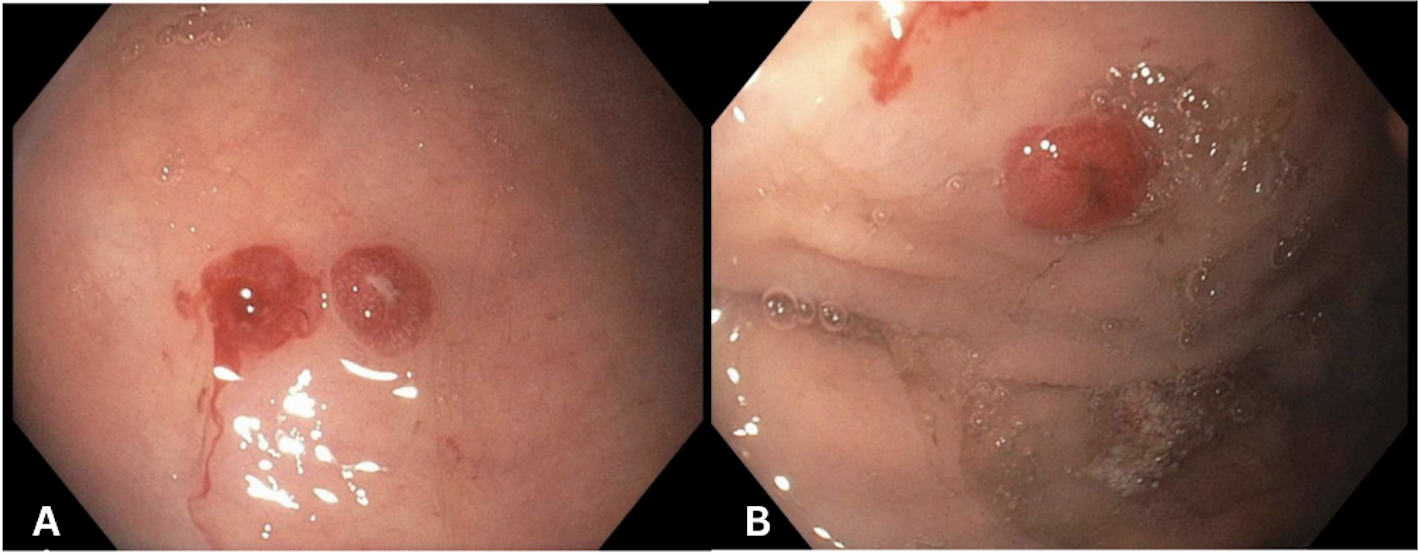Sunday Poster Session
Category: Stomach and Spleen
P2067 - A Bleeding Stomach Reveals the Lung’s Hidden Agenda
Sunday, October 26, 2025
3:30 PM - 7:00 PM PDT
Location: Exhibit Hall

Clarimar Diaz-Lopez, MD
East Carolina University Medical Center
Greenville, NC
Presenting Author(s)
Clarimar Diaz-Lopez, MD1, Rami Basmaci, MD2, Jinye Liu, DO2, Abdulazeez Swaiti, MD2, Christin Wilkinson, MD2, Sarah RT. Jahangir, MD3, Deniz Coskuner, MD3, Christina Santana, MD2, Stephanie Ibarra Lepe, MD2, Saeed S. Graham, MD4, William Leland, MD2, Rahul Pamarthy, MD2
1East Carolina University Medical Center, Greenville, FL; 2East Carolina University Medical Center, Greenville, NC; 3ECU Health Medical Center, Greenville, NC; 4ECU Department of Internal Medicine, Greenville, NC
Introduction: Gastrointestinal (GI) metastasis from non-GI cancers is uncommon, with spread from primary lung tumors being rare. The small bowel, stomach, and colon are the most frequently affected sites. Gastric metastasis typically occurs within five months of lung cancer diagnosis, often in older patients with a smoking history. Symptoms range from asymptomatic to melena, abdominal pain, obstruction, or perforation. We present a case of gastric metastasis from squamous cell lung carcinoma presenting with melena and symptomatic anemia. Notably, PET imaging one month prior showed no metastases, and the patient had recently undergone lobectomy with mediastinal lymphadenectomy, which was negative for malignancy.
Case Description/
Methods: A 75-year-old male with hypertension, coronary artery disease, and a >50 pack-years smoking history underwent lung cancer screening, revealing a 12 mm spiculated nodule in the left upper lobe. PET showed low uptake and no distant disease. Upon follow-up, the lesion had grown to 3.0 × 2.3 cm, and lobectomy confirmed it to be moderately differentiated squamous cell carcinoma. Two weeks later, he presented to the hospital with fatigue, dyspnea, and melena. Hemoglobin was 5.1 g/dL (baseline ~13). EGD showed multiple small, raised, vascular-appearing lesions in the stomach and proximal duodenum. Biopsies revealed malignant cells morphologically and immunohistochemically consistent with pulmonary squamous cell carcinoma. Imaging revealed new liver lesions and suspected metastases to the mesentery, bone, and skull. His condition declined rapidly, and he passed away due to complications from metastatic and hospital-acquired conditions.
Discussion: GI metastasis from lung cancer is a footprint for poor prognosis, with survival often measured in weeks. Upper GI involvement is uncommon, with an incidence ranging from 0.2% to 1.7%. Spread may occur via hematogenous dissemination, direct extension, or swallowing of malignant sputum. Diagnosis is typically made by endoscopy with biopsy and histologic confirmation. Endoscopic findings may include diffuse mucosal involvement, nodular lesions with or without ulceration, volcano-like masses, or, as in this case, vascular-appearing lesions. In select patients, palliative resection and systemic therapy may help, but treatment was deferred in this case due to rapid decline. This case highlights the importance of maintaining high suspicion when evaluating new GI symptoms in patients with lung cancer, even shortly after curative-intent treatment.

Figure: Figure 1. Endoscopic images showing multiple small, raised, vascular-appearing gastric lesions consistent with metastases from squamous cell lung carcinoma. (A) Actively bleeding lesion in the gastric body, (B) Lesions in the gastric fundus
Disclosures:
Clarimar Diaz-Lopez indicated no relevant financial relationships.
Rami Basmaci indicated no relevant financial relationships.
Jinye Liu indicated no relevant financial relationships.
Abdulazeez Swaiti indicated no relevant financial relationships.
Christin Wilkinson indicated no relevant financial relationships.
Sarah Jahangir indicated no relevant financial relationships.
Deniz Coskuner indicated no relevant financial relationships.
Christina Santana indicated no relevant financial relationships.
Stephanie Ibarra Lepe indicated no relevant financial relationships.
Saeed Graham indicated no relevant financial relationships.
William Leland indicated no relevant financial relationships.
Rahul Pamarthy indicated no relevant financial relationships.
Clarimar Diaz-Lopez, MD1, Rami Basmaci, MD2, Jinye Liu, DO2, Abdulazeez Swaiti, MD2, Christin Wilkinson, MD2, Sarah RT. Jahangir, MD3, Deniz Coskuner, MD3, Christina Santana, MD2, Stephanie Ibarra Lepe, MD2, Saeed S. Graham, MD4, William Leland, MD2, Rahul Pamarthy, MD2. P2067 - A Bleeding Stomach Reveals the Lung’s Hidden Agenda, ACG 2025 Annual Scientific Meeting Abstracts. Phoenix, AZ: American College of Gastroenterology.
1East Carolina University Medical Center, Greenville, FL; 2East Carolina University Medical Center, Greenville, NC; 3ECU Health Medical Center, Greenville, NC; 4ECU Department of Internal Medicine, Greenville, NC
Introduction: Gastrointestinal (GI) metastasis from non-GI cancers is uncommon, with spread from primary lung tumors being rare. The small bowel, stomach, and colon are the most frequently affected sites. Gastric metastasis typically occurs within five months of lung cancer diagnosis, often in older patients with a smoking history. Symptoms range from asymptomatic to melena, abdominal pain, obstruction, or perforation. We present a case of gastric metastasis from squamous cell lung carcinoma presenting with melena and symptomatic anemia. Notably, PET imaging one month prior showed no metastases, and the patient had recently undergone lobectomy with mediastinal lymphadenectomy, which was negative for malignancy.
Case Description/
Methods: A 75-year-old male with hypertension, coronary artery disease, and a >50 pack-years smoking history underwent lung cancer screening, revealing a 12 mm spiculated nodule in the left upper lobe. PET showed low uptake and no distant disease. Upon follow-up, the lesion had grown to 3.0 × 2.3 cm, and lobectomy confirmed it to be moderately differentiated squamous cell carcinoma. Two weeks later, he presented to the hospital with fatigue, dyspnea, and melena. Hemoglobin was 5.1 g/dL (baseline ~13). EGD showed multiple small, raised, vascular-appearing lesions in the stomach and proximal duodenum. Biopsies revealed malignant cells morphologically and immunohistochemically consistent with pulmonary squamous cell carcinoma. Imaging revealed new liver lesions and suspected metastases to the mesentery, bone, and skull. His condition declined rapidly, and he passed away due to complications from metastatic and hospital-acquired conditions.
Discussion: GI metastasis from lung cancer is a footprint for poor prognosis, with survival often measured in weeks. Upper GI involvement is uncommon, with an incidence ranging from 0.2% to 1.7%. Spread may occur via hematogenous dissemination, direct extension, or swallowing of malignant sputum. Diagnosis is typically made by endoscopy with biopsy and histologic confirmation. Endoscopic findings may include diffuse mucosal involvement, nodular lesions with or without ulceration, volcano-like masses, or, as in this case, vascular-appearing lesions. In select patients, palliative resection and systemic therapy may help, but treatment was deferred in this case due to rapid decline. This case highlights the importance of maintaining high suspicion when evaluating new GI symptoms in patients with lung cancer, even shortly after curative-intent treatment.

Figure: Figure 1. Endoscopic images showing multiple small, raised, vascular-appearing gastric lesions consistent with metastases from squamous cell lung carcinoma. (A) Actively bleeding lesion in the gastric body, (B) Lesions in the gastric fundus
Disclosures:
Clarimar Diaz-Lopez indicated no relevant financial relationships.
Rami Basmaci indicated no relevant financial relationships.
Jinye Liu indicated no relevant financial relationships.
Abdulazeez Swaiti indicated no relevant financial relationships.
Christin Wilkinson indicated no relevant financial relationships.
Sarah Jahangir indicated no relevant financial relationships.
Deniz Coskuner indicated no relevant financial relationships.
Christina Santana indicated no relevant financial relationships.
Stephanie Ibarra Lepe indicated no relevant financial relationships.
Saeed Graham indicated no relevant financial relationships.
William Leland indicated no relevant financial relationships.
Rahul Pamarthy indicated no relevant financial relationships.
Clarimar Diaz-Lopez, MD1, Rami Basmaci, MD2, Jinye Liu, DO2, Abdulazeez Swaiti, MD2, Christin Wilkinson, MD2, Sarah RT. Jahangir, MD3, Deniz Coskuner, MD3, Christina Santana, MD2, Stephanie Ibarra Lepe, MD2, Saeed S. Graham, MD4, William Leland, MD2, Rahul Pamarthy, MD2. P2067 - A Bleeding Stomach Reveals the Lung’s Hidden Agenda, ACG 2025 Annual Scientific Meeting Abstracts. Phoenix, AZ: American College of Gastroenterology.
